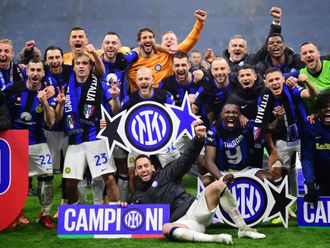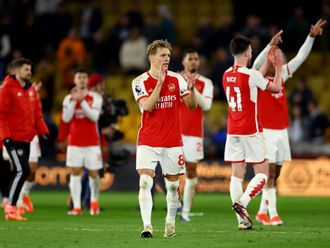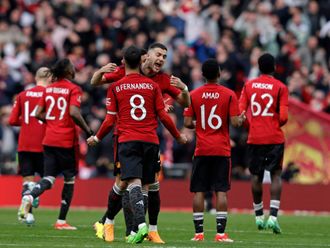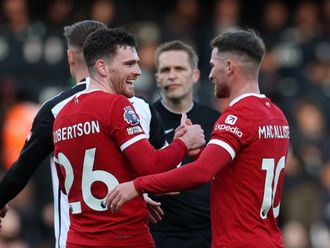London: No sentient being who sees the new Sir Bobby Robson documentary, ‘More Than a Manager’, will reach the end without welling up — and most will shed tears. The great football leaders leave a particular kind of void that illustrates the power they have over our lives.
Within a fortnight, as Britain blazes with early summer light, football will have confronted the shock of Sir Alex Ferguson being felled by a brain haemorrhage, and seen Arsene Wenger leave the stage at Arsenal after 22 years. Within days, screenings of ‘More Than a Manager’ at Wembley, St James’ Park and Ipswich’s Portman Road will renew interest in Robson’s super-eventful career with Ipswich, England, Barcelona and Newcastle. The great managers only grow in stature as their achievements recede.
The Robson film delivers tantalising images of the game’s future, because Pep Guardiola is in his Barcelona team and Jose Mourinho, often beaming, is alongside as translator and later whizz-kid assistant coach.
Robson could not have known he was laying the ground for one of the most operatic clashes in Spanish football: Guardiola v Mourinho, Barcelona v Real Madrid; or indeed the collision of two financial empires in Manchester: City against United.
The convergence of these events: Ferguson’s medical emergency, Wenger’s Arsenal departure, and the revisiting of the Robson story, will induce in many of my generation a feeling that statesman managers are a thing of the past. The top coaches still carry a lustre (the so-called luxury managers), but countless others merely hang on in a world of hounding and lampoonery.
Scanning the game now, you wonder whether any of the current A-list managers will be seen in history’s mirror as spiritual leaders in the way of Bill Shankly, or Ferguson, or Wenger in his first 10 years at Arsenal. All laid out a programme that was as much about values as getting the ball in the onion bag — though without one there is not much chance of imposing the other.
Only success renews the mandate to stamp a vision on players, club and fans, as Wenger found out. His was a manifesto drained of the authority that winning brings. But he never quite lost the magnetism radiated by managers at the highest level, as his send-off demonstrates. Arsenal fans aside, for a minute, Wenger is being clapped off the stage by supporters from Cornwall to Cumbria.
When you see tribalism suspended in this way, you know you are looking at human qualities with universal appeal. And that appeal, interestingly, is partly rooted in the urge to believe, to see a manager as special, charismatic, a leader.
This is no easy role to fill, but it was performed by Shankly, Brian Clough, Robson, Ferguson and Wenger at various points. In all cases, all followers of football can recognise the kind of strengths an Alan Pardew, say, can never quite expect to bring to the party. One word for it might be soul.
Those extraordinary figures are still coming through, no doubt, but we no longer -expect them to -display their characters in one-club dynasties, because the modern game is set up to kill longevity.
There are still glimpses of special unions taking shape. At Anfield recently, for instance, Jurgen Klopp turned Liverpool fans from groaning to roaring support with a single indignant gesture to the crowd. Klopp was able to turn thousands of people from feeling one thing to something else entirely. For that to happen, the crowd must want to be directed, to be shown what to feel.
This is power: the kind of power Shankly possessed, before Bob Paisley and Joe Fagan managed with a quieter type of aura. Mourinho, an arch realist, makes no attempt to turn audiences into disciples. He is no social worker, no crypto-Mayor.
Guardiola, on the other hand, loves the mass euphoria a manager can generate between team and spectators, but you can tell he knows it’s ephemeral. Guardiola is a manager who looks to create new waves, but also stay ahead of them, so he can never be engulfed by failure.
Watching this shift from patriarch to hired gun, it’s tempting to think: No More Heroes. No longer will a Bobby Robson be able to transform an Ipswich Town, changing a town’s self-image.
No more will a Ferguson be allowed four years to rewrite a stalled club’s culture. There are “strong” managers around who look like shaping clubs in their own image, Klopp and Tottenham’s Mauricio Pochettino for example. Yet we are surely letting go of a time when these people could be the guiding lights for whole towns and cities — stand-in politicians at a time when faith in real politicians has collapsed.
It makes for an amusing overstatement. In a world, where politics has imploded, the great football managers can still inspire multitudes to follow them wherever they go. Safer, perhaps, to say with certainty that tribalism ceases when managerial greatness shows its face.
At the end of the story, anyway. The reverence for Robson, Ferguson, Wenger and others across the whole game is reassuring, and shows what we really value. Only the lost causes in football crowds refuse to see that respect is a pleasurable thing to feel.
— The Telegraph Group Ltd, London











